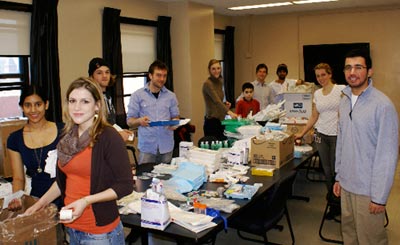 |
| The scene at a recent sorting session. Clockwise, starting in the immediate left foreground, are Achelle LeBlanc, Sheila Ghosh, Michel Daoust, Keith Baglole, Martha Carmichael, 11-year old Joseph Lamey, Matt Kutcher, Aniket Hooda, Nicola Smith and Mohammad Afzal. |
The Medical Equipment Recovery Initiative (MERcI) at Ľ∆…ę÷Ī≤• Medical School has attracted such commitment from medical students here, they are now seeking to engage their counterparts across the country.
MERcI was established in 2008 at Ľ∆…ę÷Ī≤• by five Class of 2012 medical students: Rosie Ashton, Heather Poushay, Nicole Delaney, Sean Bennett, and Josh Gould, with support from Dr. Des Leddin, a Ľ∆…ę÷Ī≤• faculty member and physician in the Department of Medicine.
The organization sends medical items such as endoscopic disposables, catheters, bandages, gloves and wound dressings to developing countries.
‚ÄúHospitals have to overstock. A certain percentage of stock expires and gets thrown out,‚ÄĚ says Dr. Leddin. ‚ÄúIt is, however, perfectly good and rather than disposing of it, we send it to centres in need. A single wire used in endoscopy procedures can cost $1,000, about three times the annual income in some countries. Theoretically it has an expiry date, but plastic and metal do not degrade quickly. It makes no sense to trash it one day, post expiry.‚ÄĚ
A tangible way to help
This initiative has raised some challenging dilemmas though. ‚ÄúOne ethical problem we‚Äôve encountered is if it‚Äôs not good enough for Canadians, why is it good enough for them? Well, we are not telling the centres how to use it; we are just sending it. We are not paternalistic, and incidentally, I would have no problem with any of the equipment being used on myself.‚ÄĚ
Ms. Ashton, the past-president of the Ľ∆…ę÷Ī≤• Medical Students‚Äô Society Global Health Initiative, was the first connector liaison when MERcI initially began. ‚ÄúI was mainly inspired by Yale University‚Äôs REMEDY project and, of course, Dr. Leddin. Being in Bolivia, he recognized the medical needs that weren‚Äôt being met in those places. As a student, I can‚Äôt practise medicine and so this was a tangible way for me to help.‚ÄĚ
REMEDY, Recovered Medical Equipment for the Developing World, is a non-profit scheme promoting the recovery of surplus supplies for redistribution to developing countries.
MERcI did not only interest students and doctors. ‚ÄúThe ward aid, an employee of the hospital, was extremely receptive and helped out greatly in saving the equipment for us,‚ÄĚ saysMs. Ashton. ‚ÄúThey see first-hand how much equipment, which is perfectly fine, gets thrown out.
She notes MERcI has also met with broad support from Capital Health, and in particular the Capital District Health Authority’s Vice President of Medicine, Brendan Carr M.D.
Committed
Current Global Health Liaison Achelle LeBlanc (Class of 2013), is also deeply involved in the project. ‚ÄúWe are now trying to establish a national MERcI, getting representatives at every medical school in Canada to become involved.‚ÄĚ
The University of Alberta and Ľ∆…ę÷Ī≤• were the first in Canada to establish the initiative. McMaster University and the University of Western Ontario have developed theirs independently. According to Ms. LeBlanc, ‚ÄúThe program is new and will continue to improve. It‚Äôs exciting to see it expanding to the other medical schools.‚ÄĚ
As the main supervisor, Dr. Leddin hopes to see MERcI become a national and international venture. ‚ÄúWe can already see this beginning to happen. The students have become extremely involved and their commitment will take this initiative a long way.‚ÄĚ
To date, the Ľ∆…ę÷Ī≤• medical students have sent approximately $200,000 worth of equipment to developing countries.¬†
